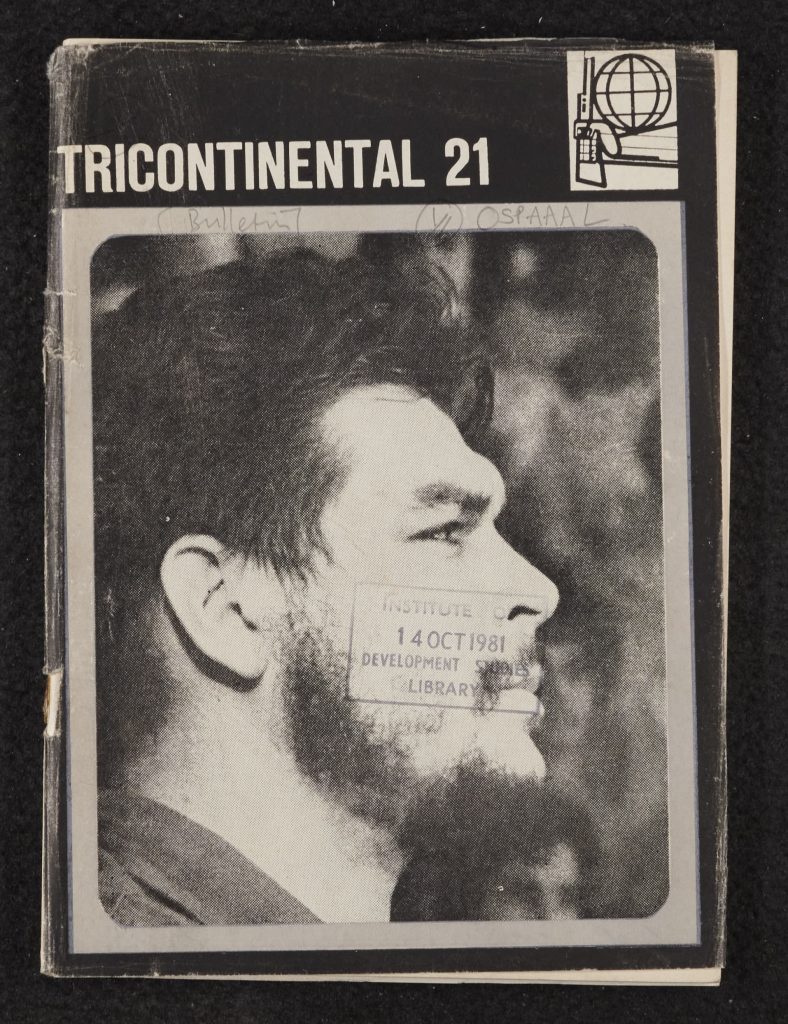Foreword
Erica Nelson
When I first sat down in a reading room at the University of Sussex Library with the stack of Tricontinentals, I went looking for the death of Che Guevara. He was murdered by Bolivian soldiers acting on behalf of a military dictatorship (and in coordination with the CIA) in the small village of La Higuera on 9th October 1967, and I was curious to know how he was memorialised by the Organization for the Solidarity of the Peoples of Africa, Asia and Latin America (OSPAAAL). My own formation as a Latin American historian was entwined with this pivotal moment, from witnessing student protests in La Paz against the presidential campaign of ex-military dictator General Hugo Suárez Bánzer, to interviewing an ex-Bolivian guerrilla who fought alongside Guevara in those last weeks leading up to his capture and death, to translating interviews in Havana with two of Fidel Castro’s official photographers – including with the son of the man who memorialised Che in ‘that’ photo. Issue 21, December 1967, is dedicated to Che and his contribution to worldwide revolutionary struggles, but it is clear from the coverage his death receives that he was far from icon status at the time.

Why start with a death?
Before the Tricontinental series was re-discovered, re-catalogued and tucked away in archive-grade boxes on the shelves of the BLDS Legacy Collection, the series sat gathering dust in a corner of the Institute of Development Studies’ basement, having first arrived as a collection in 1981 (with a few stray copies arriving earlier, in 1978 and 1979). The resistance history contained within these documents was perhaps of little priority to contemporary practitioners of international development, even though the origin story of OSPAAAL, the organisation for which Tricontinental was the official periodical, ran in parallel with IDS’ own. Both launched into existence in 1966, smack dab in the middle of the ‘Decade of Development’.
Now, as I write this foreword on 14 March 2025, it is within a moment of profound and fast-moving geopolitical change. The so-called ‘Washington Consensus’ that shaped international development, long resisted in the pages of Tricontinental, is unravelling on a daily basis. USAID, first created by President John F Kennedy in 1961, was dealt potentially fatal blows by the 47th president, beginning with the freeze on all aid and enforced administrative leave of the majority of staff first announced on 23 February 2025. IDS was originally established as the first national institute of development studies in a period when the UK was transitioning from acting as a colonial power to playing an ‘advisory’ role in post-colonial governments. Now, with the backdrop of 40% cuts to the UK aid budget, it is an institution actively engaged in debates on debates on whether ‘development’ as a concept or development aid as a mechanism of soft power is ’dead’. The fallout of these changes remains highly unpredictable, but the geopolitics that informed the birth of the Tricontinental journal, and which played a part in the death of Guevara, as memorialised in the 1967, are radically altered.
I ground the Foreword in these reflections because while the content of these journals has remained static, my relationship to the history of international development and resistance to development interventionism in the Cold War era is changing by the day.
The value of working with primary historical materials, whether digitised or – even better – when holding them in your hands, is that it offers a powerful critical perspective on the present. The writers of Tricontinental singing the praises of the guerrilla campaign in the Chapare region of Bolivia in July 1967 couldn’t foresee the assassination of Che just three months later. They couldn’t have predicted that the General Bánzer, personally responsible for the torture and disappearance of so-called ‘leftists’ and ‘communists’ and members of the revolutionary guerrilla forces, would refashion himself as a democratic political leader and successfully run for the presidential office three decades later. Yet, I can analyse their understanding of the reality in which they lived and the political strategies (successful or not) that they documented, and use this engagement with the past to cast a critical lens on our current state of affairs. The authors’ contemporary understanding of their own reality can also be the basis for a critical reflection on my own limitations as a historian (perhaps more eager to see positives in US international development history thirty years ago than now).
I therefore urge each person who downloads an issue, or holds one in your hands, to find a point of deeper connection to the histories in Tricontinental. It is easy enough to scan through the cover art or flip through whole runs of months and years, but it is worthwhile spending some time reading around and digging around the histories that might be sitting just outside the frame of what is contained in the articles themselves. I hope the approaches and examples in the pages that follow provide inspiration for readers to themselves take a deep dive into the world of revolutionary periodicals.

